初中英语口语教材
英语口语教材推荐
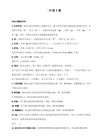
4.《走遍美国》
这个也很经典,也是采用了大量的视频图片等等提供了一个全外国的氛围。
5.词汇书里面我比较喜欢的是剑桥《剑桥英语在用初/中/高级词汇》
还有《Tower press的英语词汇系列丛书》 语法书里面《剑桥英语用初/中/高级语法》
总之英语在用系列都不错
剑桥出版社的哦~~
2. 听力与口语方面
做完了纵向比较就是横向比较了。这个需要你搜集你的错题。错题本是必不可少的东西,能让你明白你的弱势强势各在何处。
如果你是准备国外考试的话.一样的道理.
雅思有雅思的听力机经
托福有托福的技巧~~~
可以上各大网站去搜索这些
我就混在一起说了因为这两个是相辅相成的.
我们经常说听说听说,听力和口语是分不开的.只有你口语发音准确,知道单词的正确发音,你的耳朵才能在第一时间里面正确接受到对方的信息,准确捕获这个词...所以对于很多对于英语听力非常苦恼的朋友来说,其实英语听力的瓶颈不是在于听力.而是在于-----口语!!!而且尤其是你的单词发音是否标准....
然后看电影的时候,不要只看一遍,要反反复复看,不要打中文字幕,打英文字幕,就算你再不懂,千万不要当时查字典,有的时候关键字会在情节中反复出现,通过揣摩看诶猜测出词义。这样这些词你可以记得很牢。
另外就是如果你对英式英语感兴趣最好看英国老电影,如果你对美式英语感兴趣,那么时下的美剧是你比较好的选择,不要看情节制胜的片子比如越狱,也不要看专业词汇特别多的片子比如豪斯医生,不要看不切实际的片子比如英雄,去看看那些比较综合的讲述人生的片子,老友记不错,然后就是人人都爱雷蒙德,这些都很棒。还有就是……欲望都市和绝望的主妇可以满足你学习XX词汇的愿望(嘿嘿……)
这里我建议你不要去背那些商业片,比如蜘蛛侠啊 魔戒啊之类的。我建议你以动画片开始,我背的第一部动画片是Monsters Inc.(怪物电力公司)然后可以接触到经典电影中去(千万不要试图去背阿甘正传……如果你想学弱智讲话我不拦你……)
提高英语口语能力的学习资料推荐

提高英语口语能力的学习资料推荐你是否曾经遇到过这样的情况:在学校学了很多年的英语,但却无法流利地与外国人交流?要改变这种局面,最重要的就是提高口语能力。
然而,学习英语口语并不是一件容易的事情,需要付出很多努力和时间。
为了帮助大家提高英语口语能力,我在这里推荐几本适合的学习资料。
这些资料内容丰富,适合不同水平的学习者,并且非常实用。
1. 基础口语教材H2: 《美语从头说起》这是一本适合初学者的口语教材,内容简单易懂。
书中包含了常用的日常口语表达,例如问候、自我介绍、购物等等。
通过学习这本书,你可以建立起基本的英语口语能力。
此外,这本书还有配套的听力练习和词汇练习,可以帮助巩固所学内容。
H2: 《实用英语口语》这本口语教材适合中级水平的学习者。
书中包含了各种实用的口语表达,涉及到工作、学习、旅行、饮食等各个方面。
通过学习这本书,你可以提高自己的口语实际运用能力,并且丰富自己的词汇量。
2. 口语练习参考书H2: 《场景口语实训》这本书采用了场景对话的形式,根据不同的情境提供了口语表达的模板。
例如在医院、餐厅、银行等场景下的口语对话。
学习这本书可以帮助你更好地应对不同的场景,并且提高自己的口语表达能力。
H2: 《英语口语速成》这本书以快速提高口语能力为目标,提供了丰富的口语练习内容。
包括口语口音练习、口语听力训练、情景对话等等。
学习这本书可以加强你的口语能力,并且提高对英语的听力理解能力。
3. 口语材料收集H2: 听笑话了解外国人的幽默,可以帮助你更好地理解英语中的双关语和语言游戏。
你可以在网上搜索英语笑话并用英语朗读出来,这样不仅可以提高你的发音和语速,还可以锻炼你的口语技巧。
H2: 听英语歌曲学习英语歌曲不仅可以提高你的听力,还可以提高你的口语能力。
尝试跟着歌曲的歌词朗读出来,并模仿歌手的发音和语调。
这样可以帮助你锻炼口语的流利性和语音的准确性。
4. 在线资源H2: 英语口语网站有很多在线学习口语的网站可以帮助你提高口语能力。
初中英语口语活动教案范文
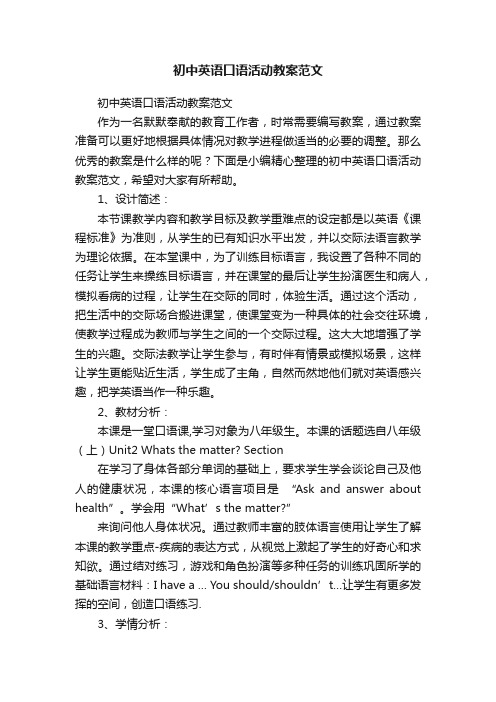
初中英语口语活动教案范文初中英语口语活动教案范文作为一名默默奉献的教育工作者,时常需要编写教案,通过教案准备可以更好地根据具体情况对教学进程做适当的必要的调整。
那么优秀的教案是什么样的呢?下面是小编精心整理的初中英语口语活动教案范文,希望对大家有所帮助。
1、设计简述:本节课教学内容和教学目标及教学重难点的设定都是以英语《课程标准》为准则,从学生的已有知识水平出发,并以交际法语言教学为理论依据。
在本堂课中,为了训练目标语言,我设置了各种不同的任务让学生来操练目标语言,并在课堂的最后让学生扮演医生和病人,模拟看病的过程,让学生在交际的同时,体验生活。
通过这个活动,把生活中的交际场合搬进课堂,使课堂变为一种具体的社会交往环境,使教学过程成为教师与学生之间的一个交际过程。
这大大地增强了学生的兴趣。
交际法教学让学生参与,有时伴有情景或模拟场景,这样让学生更能贴近生活,学生成了主角,自然而然地他们就对英语感兴趣,把学英语当作一种乐趣。
2、教材分析:本课是一堂口语课,学习对象为八年级生。
本课的话题选自八年级(上)Unit2 Whats the matter? Section在学习了身体各部分单词的基础上,要求学生学会谈论自己及他人的健康状况,本课的核心语言项目是“Ask and answer about health”。
学会用“What’s the matter?”来询问他人身体状况。
通过教师丰富的肢体语言使用让学生了解本课的教学重点-疾病的表达方式,从视觉上激起了学生的好奇心和求知欲。
通过结对练习,游戏和角色扮演等多种任务的训练巩固所学的基础语言材料:I have a … You should/shouldn’t…让学生有更多发挥的空间,创造口语练习.3、学情分析:八年级是学习英语的关键时期,这个阶段的学生活泼、好奇心和求知欲望强。
比如像本课所涉及的有关健康的话题是他们之前从未接触过的,因此,他们渴望用英语来表达。
英语口语教材推荐

2.《new concept English》
如果你没有听说过新概念就太……
新概念作为英语教材的龙头老大,绝对是有他风靡数十年的魅力所在的。而且新概念的配套自学辅导丛书、测试题等等教辅都有很完善的配套。绝对可以满足你的需要的哦
3.《Look Ahead》(展望未来)
这本书是走遍美国的英国妈妈版了。可以说走遍美国就是由于受到这套教材的启发才编写出来的。展望未来是到底的英式发音,并且也是及其贴近英国民俗的一套教材。强化四会技能,也配有教师用书、学生练习册等等。是许多外国语学校的高级教材
举个很简单的例子.horizen 这个词的发音音标应该是/he'raizen/但是很多人都发成/'horizen/ 那么你脑中有个错误的期待,怎么可能捕捉到那个正确的单词呢?!在当你苦苦的等待你脑海中期待的那个单词的时候,正确的单词早就飞过去了.....
所以,我推荐你买本专业训练听力的书,分三步来做.书随便什么都可以啦~你要是想要我给你推荐的话.英语初级/中级/高级听力不错
这里我建议你不要去背那些商业片,比如蜘蛛侠啊 魔戒啊之类的。我建议你以动画片开始,我背的第一部动画片是Monsters Inc.(怪物电力公司)然后可以接触到经典电影中去(千万不要试图去背阿甘正传……如果你想学弱智讲话我不拦你……)
我背过的电影还有 音乐之声(The sound of the Music)魂断蓝桥(waterloo Bridge) 还有独立日(Independence day)这个我不建议你背……等等……
4.《走遍美国》
这个也很经典,也是采用了大量的视频图片等等提供了一个全外国的氛围。
5.词汇书里面我比较喜欢的是剑桥《剑桥英语在用初/中/高级词汇》
快速提升英语口语的书籍
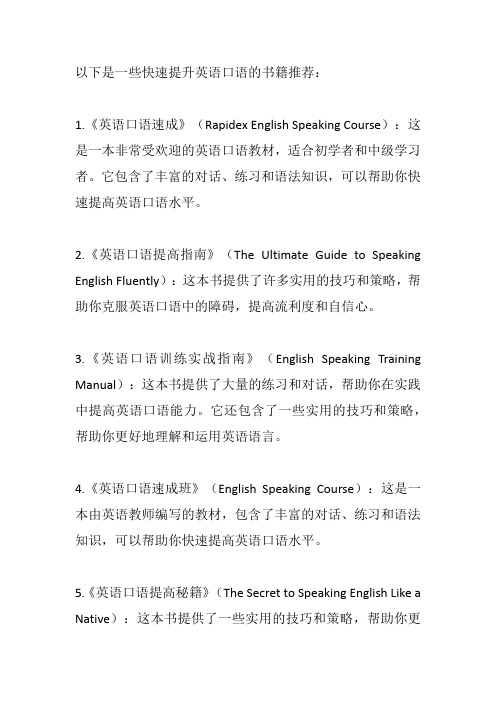
以下是一些快速提升英语口语的书籍推荐:
1.《英语口语速成》(Rapidex English Speaking Course):这是一本非常受欢迎的英语口语教材,适合初学者和中级学习者。
它包含了丰富的对话、练习和语法知识,可以帮助你快速提高英语口语水平。
2.《英语口语提高指南》(The Ultimate Guide to Speaking English Fluently):这本书提供了许多实用的技巧和策略,帮助你克服英语口语中的障碍,提高流利度和自信心。
3.《英语口语训练实战指南》(English Speaking Training Manual):这本书提供了大量的练习和对话,帮助你在实践中提高英语口语能力。
它还包含了一些实用的技巧和策略,帮助你更好地理解和运用英语语言。
4.《英语口语速成班》(English Speaking Course):这是一本由英语教师编写的教材,包含了丰富的对话、练习和语法知识,可以帮助你快速提高英语口语水平。
5.《英语口语提高秘籍》(The Secret to Speaking English Like a Native):这本书提供了一些实用的技巧和策略,帮助你更
好地理解和运用英语语言。
它还包含了一些流利度和自信心的提高方法,可以帮助你快速提高英语口语水平。
初中英语口语交际教案
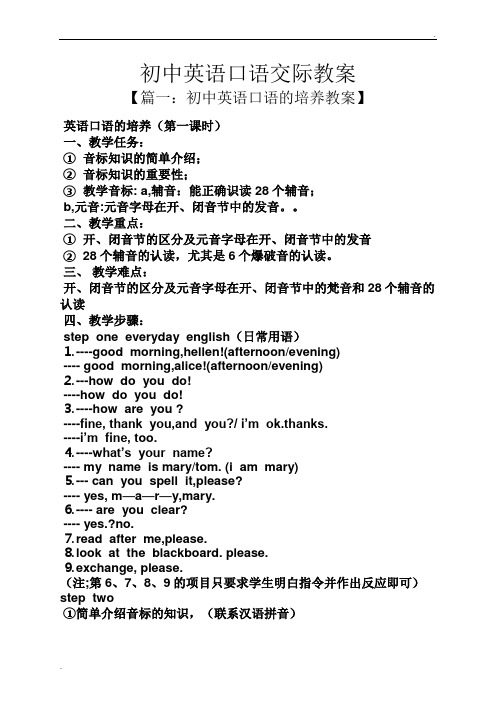
初中英语口语交际教案【篇一:初中英语口语的培养教案】英语口语的培养(第一课时)一、教学任务:①音标知识的简单介绍;②音标知识的重要性;③教学音标: a,辅音:能正确识读 28个辅音;b,元音:元音字母在开、闭音节中的发音。
二、教学重点:①开、闭音节的区分及元音字母在开、闭音节中的发音② 28个辅音的认读,尤其是6个爆破音的认读。
三、教学难点:开、闭音节的区分及元音字母在开、闭音节中的梵音和28个辅音的认读四、教学步骤:step one everyday english(日常用语)⒈----good morning,hellen!(afternoon/evening)---- good morning,alice!(afternoon/evening)⒉---how do you do!----how do you do!⒊----how are you ?----fine, thank you,and you?/ i’m ok.thanks.----i’m fine, t oo.⒋----what’s your name?---- my name is mary/tom. (i am mary)⒌--- can you spell it,please?---- yes, m—a—r—y,mary.⒍---- are you clear?---- yes.?no.⒎read after me,please.⒏look at the blackboard. please.⒐exchange, please.(注;第6、7、8、9的项目只要求学生明白指令并作出反应即可)step two①简单介绍音标的知识,(联系汉语拼音)②说明学习音标的重要性。
(让学生明白学好音标除了能自己独立识读英语单词外,更重要的是能轻松记忆后面将要学到的所有单词,而记忆好单词是学好英语的最基本保证。
)③音标慨况:元音(单双元音);辅音(清浊辅音)。
初中英语口语课程教案
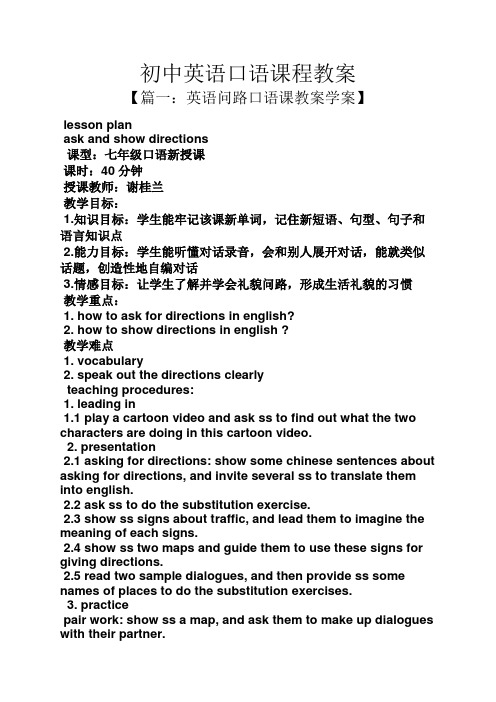
初中英语口语课程教案【篇一:英语问路口语课教案学案】lesson planask and show directions课型:七年级口语新授课课时:40分钟授课教师:谢桂兰教学目标:1.知识目标:学生能牢记该课新单词,记住新短语、句型、句子和语言知识点2.能力目标:学生能听懂对话录音,会和别人展开对话,能就类似话题,创造性地自编对话3.情感目标:让学生了解并学会礼貌问路,形成生活礼貌的习惯教学重点:1. how to ask for directions in english?2. how to show directions in english ?教学难点1. vocabulary2. speak out the directions clearlyteaching procedures:1. leading in1.1 play a cartoon video and ask ss to find out what the two characters are doing in this cartoon video.2. presentation2.1 asking for directions: show some chinese sentences about asking for directions, and invite several ss to translate them into english.2.2 ask ss to do the substitution exercise.2.3 show ss signs about traffic, and lead them to imagine the meaning of each signs.2.4 show ss two maps and guide them to use these signs for giving directions.2.5 read two sample dialogues, and then provide ss some names of places to do the substitution exercises.3. practicepair work: show ss a map, and ask them to make up dialogues with their partner.4. conclusion4.1 make a review of the useful phrases and sentence patterns.5. assignment5.1 collect more phrases and sentence patterns about asking and showing directions as possible as they can5.2 recite these two sample dialogues5.3 make up and write down two new dialogues according to the sample dialogues.ask and show directions(问路与指路)learning proposal (学案)课型:七年级口语新授课课时:40分钟授课教师:谢桂兰教学目标:1.知识目标:学生能牢记该课新单词,记住新短语、句型、句子和语言知识点2.能力目标:学生能听懂对话录音,会和别人展开对话,能就类似话题,创造性地自编对话3.情感目标:让学生了解并学会礼貌问路,形成生活礼貌的习惯教学重点:1. how to ask for directions in english?2. how to show directions in english ?教学难点1. vocabulary2. speak out the directions clearlylearning procedures (学习步骤):1. watch a cartoon video and try to find out what the rabbits are doing.(观看卡通视频,说说视频中两只兔子在做什么)2. recite the following sentence patterns for asking directions and then do the substitution exercises with new names of places in the left box. (背诵下面的问路的常用句型,并用右边方框中的地名做替换练习) a. excuse me, could you please tell me the way to …..? b. sorry to trouble you, how can i get to …..? c. excuse me, do you know where is ……?3. learn the traffic signs and match each sign with its meaning (学习以下交通标识,并将其与相应的意思连接起来)zebra crossingcrossroadtraffic lightturn leftgo straight aheadturn right4. translate the following phrases into english. (将下列短语翻译成英文)径直走:在十字路口:在红绿灯处:斑马线:在你的左边 :旁边:5. translate the following sentences into chinese.(将下列句子翻译成中文)go straight ahead about 10 minutes and you’ll see it on the left side:go straight and then turn left at the first corner:how long will it take me to get there?:it’s only about ten minutes on foot (by bus):sorry, i don’t know. i’m new around here:ask the policeman over there, please:6. read the following maps and show directions for a stranger according to the arrows(按照箭头指示, 为陌生人指路。
人教版初中英语教材

人教版初中英语教材人教版初中英语教材是由人民教育出版社所编写的初中英语教材。
这套教材以培养学生的英语口语、听力、阅读和写作能力为目标,采用了全英教学的方式,注重培养学生的语感和实际应用能力。
人教版初中英语教材分为七个年级,每个年级由两册教材组成:《英语》上册和《英语》下册。
教材内容包括生活常识、日常交际用语、文化背景等,涵盖了学生学习英语所需的基础知识和技能。
每个单元都有丰富多样的课文、练习题和听力材料,旨在锻炼学生的听说读写各方面能力。
教材的编排结构合理,注意循序渐进地引导学生学习。
每个单元都由导入、新课呈现、语法规则讲解、练习、拓展阅读和综合应用等部分组成。
导入部分通过生动有趣的图片、视频等方式激发学生的学习兴趣;新课呈现部分通过对话、情景演示等形式介绍新的语言知识;语法规则讲解部分简明扼要,易于理解;练习部分则有大量的口语、听力、阅读和写作练习题,能够帮助学生巩固所学知识;拓展阅读和综合应用部分注重培养学生对英语的综合运用能力。
教材选材广泛,旨在丰富学生的知识面。
教材中涉及的话题包括家庭、学校、交通、购物、节日等,与学生的生活密切相关。
同时,教材还涵盖了一些文化背景知识,如英语国家的风土人情、习俗等,帮助学生了解不同文化背景下的交流方式和礼仪规范。
人教版初中英语教材注重培养学生的英语语感和实际应用能力,注重听说读写的全面发展。
通过丰富多样的教学材料和练习题,激发学生的学习兴趣,提高学生的学习效果。
同时,教材的编排结构合理,内容合理,适应了初中学生的学习特点和需求。
总之,人教版初中英语教材是一套富有特色的初中英语教材。
它旨在培养学生的英语语感和实际应用能力,通过丰富多样的教学材料和练习题,激发学生的学习兴趣,提高学生的学习效果。
同时,教材的编排结构合理,内容合理,适应了初中学生的学习特点和需求。
中学英语口语课教案
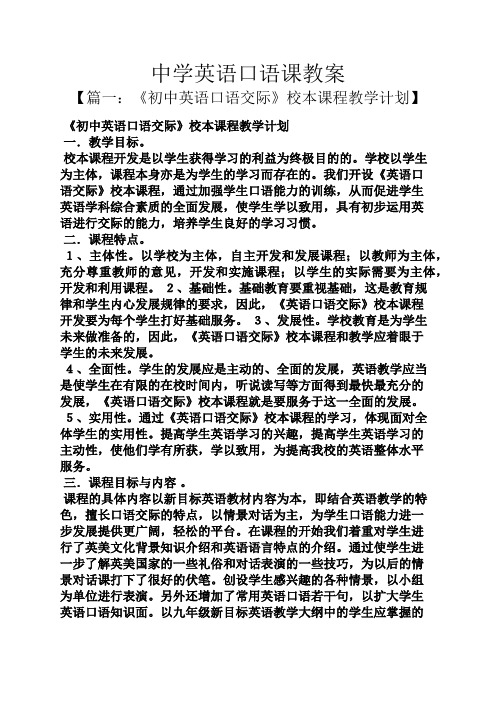
中学英语口语课教案【篇一:《初中英语口语交际》校本课程教学计划】《初中英语口语交际》校本课程教学计划一.教学目标。
校本课程开发是以学生获得学习的利益为终极目的的。
学校以学生为主体,课程本身亦是为学生的学习而存在的。
我们开设《英语口语交际》校本课程,通过加强学生口语能力的训练,从而促进学生英语学科综合素质的全面发展,使学生学以致用,具有初步运用英语进行交际的能力,培养学生良好的学习习惯。
二.课程特点。
1、主体性。
以学校为主体,自主开发和发展课程;以教师为主体,充分尊重教师的意见,开发和实施课程;以学生的实际需要为主体,开发和利用课程。
2、基础性。
基础教育要重视基础,这是教育规律和学生内心发展规律的要求,因此,《英语口语交际》校本课程开发要为每个学生打好基础服务。
3、发展性。
学校教育是为学生未来做准备的,因此,《英语口语交际》校本课程和教学应着眼于学生的未来发展。
4、全面性。
学生的发展应是主动的、全面的发展,英语教学应当是使学生在有限的在校时间内,听说读写等方面得到最快最充分的发展,《英语口语交际》校本课程就是要服务于这一全面的发展。
5、实用性。
通过《英语口语交际》校本课程的学习,体现面对全体学生的实用性。
提高学生英语学习的兴趣,提高学生英语学习的主动性,使他们学有所获,学以致用,为提高我校的英语整体水平服务。
三.课程目标与内容。
课程的具体内容以新目标英语教材内容为本,即结合英语教学的特色,擅长口语交际的特点,以情景对话为主,为学生口语能力进一步发展提供更广阔,轻松的平台。
在课程的开始我们着重对学生进行了英美文化背景知识介绍和英语语言特点的介绍。
通过使学生进一步了解英美国家的一些礼俗和对话表演的一些技巧,为以后的情景对话课打下了很好的伏笔。
创设学生感兴趣的各种情景,以小组为单位进行表演。
另外还增加了常用英语口语若干句,以扩大学生英语口语知识面。
以九年级新目标英语教学大纲中的学生应掌握的功能意念项目为依托,进行全面综合地训练,同时增加美国英语俚语、英语谚语、谚语名人名言、英语幽默与笑话欣赏等项目。
牛津译林版七年级上册StarterUnit1《Hello》说课稿(1)

牛津译林版七年级上册Starter Unit 1《Hello》说课稿(1)一. 教材分析《牛津译林版七年级上册Starter Unit 1》是初中英语教材的第一单元,主要是让学生熟悉和掌握基本的日常英语口语交流。
本单元的主题是介绍自己和相互认识,内容涵盖了基本的问候语、介绍自己的姓名、年龄和国籍等。
教材通过简单的对话和练习,帮助学生建立起英语学习的兴趣和信心。
二. 学情分析面对刚刚步入初中的七年级学生,他们对英语有着强烈的好奇心和求知欲,但同时也有着一定的陌生感和恐惧感。
因此,在教学过程中,我们需要关注学生的心理状态,帮助他们建立起学习的信心。
同时,由于学生的英语水平参差不齐,我们需要因材施教,尽量让每个学生都能参与到课堂活动中来。
三. 说教学目标本节课的教学目标主要有三个:1.让学生掌握基本的英语问候语,如“Hello”,“How are you?”等。
2.让学生能够用英语介绍自己的姓名、年龄和国籍。
3.培养学生的英语口语表达能力,提高他们的英语学习兴趣和自信心。
四. 说教学重难点本节课的重难点主要是让学生能够正确地发出英语问候语的音素,以及能够流利地用英语进行自我介绍。
对于一些音素比较特殊的单词,如“hello”,“world”等,需要教师进行详细的讲解和示范。
五. 说教学方法与手段在教学过程中,我会采用任务型教学法和交际式教学法,通过设定各种真实的交流情境,让学生在实践中学习和掌握英语。
同时,我会利用多媒体教学手段,如课件、视频等,来提高学生的学习兴趣和参与度。
六. 说教学过程1.热身活动:让学生用中文进行自我介绍,熟悉课堂氛围。
2.引入新课:通过展示一幅世界地图,引导学生思考如何用英语介绍自己的国家。
3.新课教授:讲解和示范基本的英语问候语和自我介绍的表达方式。
4.实践练习:让学生分组进行角色扮演,模拟真实的交流场景。
5.课堂总结:对学生的表现进行点评,强调重点知识点。
七. 说板书设计板书设计主要包括本节课的主题“Hello”和重点知识点,如“Hello”,“How are you?”,“My name is…”,“I am from…”等。
初中英语对话教程教案模板

课时:2课时年级:八年级教材:《初中英语》教学目标:1. 知识目标:学生能够掌握对话中常用的日常用语和表达方式。
2. 能力目标:学生能够运用所学语言进行简单的日常对话,提高口语交流能力。
3. 情感目标:培养学生良好的口语交流习惯,增强自信心。
教学重点:1. 日常用语和表达方式的掌握。
2. 对话场景的模拟和角色扮演。
教学难点:1. 正确运用语调和语速。
2. 适应不同场景的对话内容。
教学准备:1. 教学课件或黑板。
2. 对话场景图片或视频。
3. 学生分组用的道具或卡片。
教学过程:第一课时一、导入1. 教师用英语进行简短的自我介绍,引起学生对英语口语的兴趣。
2. 学生自由练习用英语进行自我介绍。
二、新课导入1. 教师展示对话场景图片或视频,引导学生思考如何用英语描述场景。
2. 学生分组讨论,用英语描述图片或视频中的场景。
三、新授1. 教师板书或展示课件中的日常用语和表达方式,如“Good morning!”, “How are you?”, “What’s your name?”等。
2. 学生跟读,模仿教师的发音和语调。
四、练习1. 学生分组进行角色扮演,练习对话。
2. 教师巡视指导,纠正学生的发音和语法错误。
五、巩固1. 学生进行对话接龙,巩固所学内容。
2. 教师挑选部分学生进行展示,给予鼓励和指导。
六、小结1. 教师总结本节课所学内容,强调重点和难点。
2. 学生回顾所学,提出疑问。
第二课时一、复习1. 学生用英语进行自我介绍,复习第一课时所学内容。
2. 教师提问,检查学生对日常用语的掌握情况。
二、新授1. 教师展示新的对话场景图片或视频,引导学生思考如何用英语描述场景。
2. 学生分组讨论,用英语描述图片或视频中的场景。
三、对话练习1. 学生分组进行角色扮演,练习新的对话内容。
2. 教师巡视指导,纠正学生的发音和语法错误。
四、拓展1. 学生进行对话创作,发挥想象力,编写新的对话内容。
2. 教师挑选部分学生进行展示,给予鼓励和指导。
初中英语学习需要哪些课外资料?
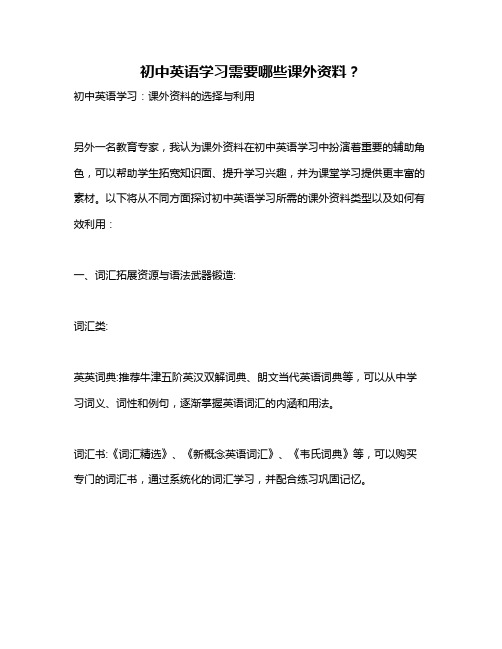
初中英语学习需要哪些课外资料?初中英语学习:课外资料的选择与利用另外一名教育专家,我认为课外资料在初中英语学习中扮演着重要的辅助角色,可以帮助学生拓宽知识面、提升学习兴趣,并为课堂学习提供更丰富的素材。
以下将从不同方面探讨初中英语学习所需的课外资料类型以及如何有效利用:一、词汇拓展资源与语法武器锻造:词汇类:英英词典:推荐牛津五阶英汉双解词典、朗文当代英语词典等,可以从中学习词义、词性和例句,逐渐掌握英语词汇的内涵和用法。
词汇书:《词汇精选》、《新概念英语词汇》、《韦氏词典》等,可以购买专门的词汇书,通过系统化的词汇学习,并配合练习巩固记忆。
趣味词汇学习材料:比如英语报刊杂志、英文网站、英语歌曲及影视作品等,可以通过趣味的方式积累词汇,并了解词汇在实际中的应用场景,提高学习效率。
语法类:语法书:《英语语法全解》、《英语语法练习册》等,可以系统学习语法知识,了解语法规则,并通过练习巩固表达。
语法网站:例如Grammarly、OxfordLearner'sDictionaries等,可以在网站上查找语法问题,并学习相关语法知识。
语法练习册:《英语语法练习册》、《高中英语语法练习题库》等,可以通过练习册测试语法知识的掌握程度,并发现学习中存在的薄弱环节。
二、阅读理解与写作能力提升:阅读类:英文原版书籍:参照学生的兴趣选择不同类型的英文小说、科普读物等,通过阅读拓宽知识面,提升英语阅读能力。
英文报刊杂志:推荐《TIME》、《National Geographic》、《BBC News》等,通过阅读理解学习英语表达,了解英语文化,同时也能获取一些时事信息。
英文绘本:更适合低年级学生,生动有趣的故事和精美插图,激发学习兴趣,提升阅读理解能力。
写作类:写作指导书:《英语写作技巧》、《英语作文范文精选》等,可以通过写作指导书学习写作技巧,掌握英语写作规范。
英文写作网站:比如Grammarly、Write&Improve等,可以在网站上学习写作技巧,并检查语法错误。
初中英语口语交际》校本教材

初中英语口语交际》校本教材Preface:The development of school-based curriculum is ultimately for the benefit of students' learning。
The school takes students as the main body。
and the curriculum itself also exists for students' learning。
We have compiled the "English Oral n" school-based textbook。
mainly to systematically arrange the content structure。
activity forms。
teaching modes。
and teaching methods of English oral n。
and establish a relatively complete school-based English oral n curriculum system that is in line with the actual n of our school。
It fully reflects the advantages and characteristics of the subject。
and gives full play to students' awareness。
initiative。
and creativity。
By strengthening students' oral ability training。
it promotes the comprehensive development of students' English subject quality。
2024北京初三英语听力口语训练书
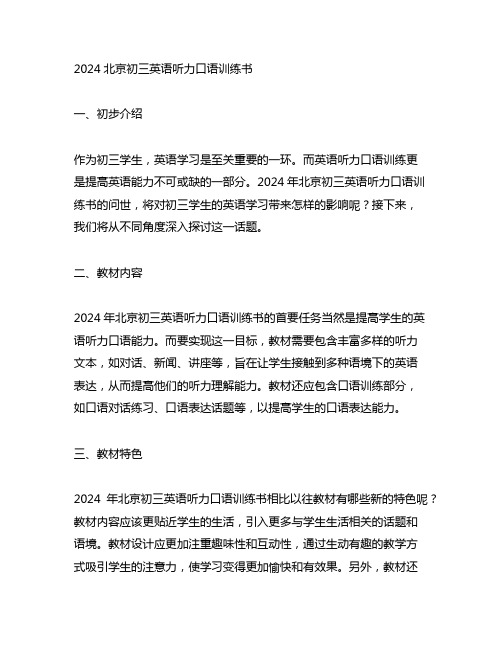
2024北京初三英语听力口语训练书一、初步介绍作为初三学生,英语学习是至关重要的一环。
而英语听力口语训练更是提高英语能力不可或缺的一部分。
2024年北京初三英语听力口语训练书的问世,将对初三学生的英语学习带来怎样的影响呢?接下来,我们将从不同角度深入探讨这一话题。
二、教材内容2024年北京初三英语听力口语训练书的首要任务当然是提高学生的英语听力口语能力。
而要实现这一目标,教材需要包含丰富多样的听力文本,如对话、新闻、讲座等,旨在让学生接触到多种语境下的英语表达,从而提高他们的听力理解能力。
教材还应包含口语训练部分,如口语对话练习、口语表达话题等,以提高学生的口语表达能力。
三、教材特色2024年北京初三英语听力口语训练书相比以往教材有哪些新的特色呢?教材内容应该更贴近学生的生活,引入更多与学生生活相关的话题和语境。
教材设计应更加注重趣味性和互动性,通过生动有趣的教学方式吸引学生的注意力,使学习变得更加愉快和有效果。
另外,教材还应充分利用现代化的技术手段,如音频、视瓶等,以提高学生的学习兴趣和参与度。
四、对学生的影响2024年北京初三英语听力口语训练书的问世,对学生的英语学习将产生积极的影响。
通过丰富多样的听力材料,学生将能够更好地理解和掌握英语的语音、语调等特点,从而提高他们的听力水平。
充分的口语训练将使学生更加自信地表达自己,增强他们的英语交流能力。
更注重生活化和趣味化的教材设计也将激发学生学习英语的兴趣,使他们更主动地投入到英语学习中去。
五、对教师的启示2024年北京初三英语听力口语训练书的推出,也将给教师带来一定的启示。
教师需要更加重视学生的听力口语训练,通过多种教学手段激发学生的学习兴趣,提高他们的学习积极性。
教师应重视教材的选择和设计,充分发挥教材在英语教学中的作用,使其更好地为教学服务。
另外,教师还需要不断丰富自己的教学经验,提高自己的教学水平,以更好地引导学生学习。
六、结语通过以上对2024年北京初三英语听力口语训练书的深入探讨,我们可以看到这一教材的出现对学生的英语学习将产生积极的影响。
初中英语课本口语对话

【导语】初中的英语课本上,有不少的英语对话提供给我们练习。
下⾯是由给⼤家整理的初中英语课本⼝语对话,供⼤家参阅!【篇⼀】初中英语课本⼝语对话 mandy: lisa, are you ok? lisa: i have a headache and i can’t move my neck. what should i do? should i take my temperature? mandy: no, it doesn’t sound like you have a fever. what did you do on the weekend? lisa: i played computer games all weekend. mandy: that’s probably why. you need to take breaks away from the computer. lisa: yeah, i think i sat in the same way for too long without moving. mandy: i think you should lie down and rest. if your head and neck still hurt tomorrow, then go to a doctor. lisa: ok. thanks, mandy.【篇⼆】初中英语课本⼝语对话 have you ever been to a museum ? anna: i went to the film museum last weekend. have you ever been there? jill: yes, i have. i went there back in april. anna: it’s really interesting, isn’t it? it’s a great way to spend a saturday afternoon. jill: yes, i love all the old movie cameras there. i learned about the inventions that led to color movies, too. anna: so, what did you do on the weekend? jill: i camped in the mountains with some friends. we put up a tent and cooked outside. anna: that sounds fun. i’ve never been camping. jill: you should try it!【篇三】初中英语课本⼝语对话 could you please clean your room ? sister: tony, could you please help out with a few things? brother: could i at least finish watching this show? sister: no. i think two hours of tv is enough for you! brother: fine. what do you want me to do? sister: could you take out the rubbish, fold the clothes and do the dishes? brother: so much? sister: yes, because mom will be back from shopping any minute now. and she won’t be happy if she sees this mess. brother: but the house is already pretty clean and tidy! sister: yes, well, it’s clean, but it’s not “mother clean”.。
英语口语 教材
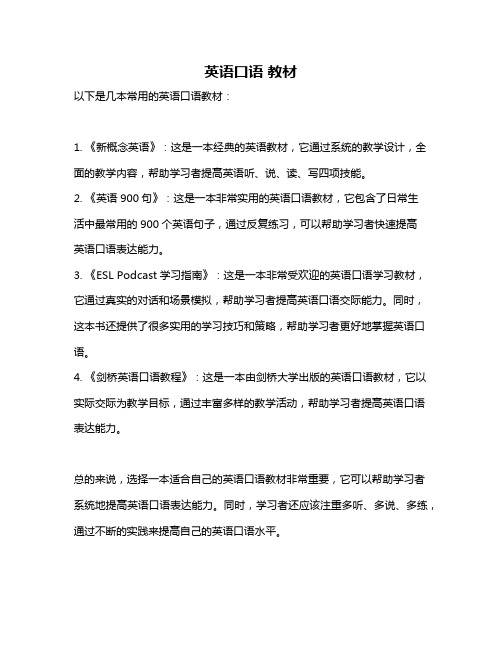
英语口语教材
以下是几本常用的英语口语教材:
1. 《新概念英语》:这是一本经典的英语教材,它通过系统的教学设计,全面的教学内容,帮助学习者提高英语听、说、读、写四项技能。
2. 《英语900句》:这是一本非常实用的英语口语教材,它包含了日常生
活中最常用的900个英语句子,通过反复练习,可以帮助学习者快速提高
英语口语表达能力。
3. 《ESL Podcast学习指南》:这是一本非常受欢迎的英语口语学习教材,它通过真实的对话和场景模拟,帮助学习者提高英语口语交际能力。
同时,这本书还提供了很多实用的学习技巧和策略,帮助学习者更好地掌握英语口语。
4. 《剑桥英语口语教程》:这是一本由剑桥大学出版的英语口语教材,它以实际交际为教学目标,通过丰富多样的教学活动,帮助学习者提高英语口语表达能力。
总的来说,选择一本适合自己的英语口语教材非常重要,它可以帮助学习者系统地提高英语口语表达能力。
同时,学习者还应该注重多听、多说、多练,通过不断的实践来提高自己的英语口语水平。
中文注音英文教材

中文注音英文教材
以下是一些中文注音英文教材:
1.《新概念英语》(New Concept English):这本教材在中国广受欢迎,其
以语法和词汇为核心,注重听、说、读、写各方面能力的训练。
中文注音
版的《新概念英语》可以帮助学习者更好地掌握英语发音和口语表达。
2.《英语900句》(English 900):这是一本非常实用的英语口语教材,包
含了日常生活中常用的900个英语句子。
中文注音版的《英语900句》可以让学习者快速掌握这些常用句子的发音,并能够进行简单的英语交流。
3.《日常口语情景会话》(Daily Conversations):这本教材包含了各种日常
生活中的情景对话,涵盖了问候、购物、旅游等多个方面。
中文注音版的
《日常口语情景会话》可以帮助学习者更好地理解不同场景下的英语表达
方式。
4.《儿童英语》(Junior English):这是一本适合儿童学习的英语教材,内
容生动有趣,注重培养孩子的听说能力。
中文注音版的《儿童英语》可以
帮助孩子快速掌握英语发音,提高他们的学习兴趣。
5.《旅游英语》(Travel English):这是一本专门针对旅游英语学习的教
材,包含了旅游中常用的各种情景对话和词汇。
中文注音版的《旅游英
语》可以帮助学习者快速掌握旅游相关的英语表达,更好地进行旅行交
流。
- 1、下载文档前请自行甄别文档内容的完整性,平台不提供额外的编辑、内容补充、找答案等附加服务。
- 2、"仅部分预览"的文档,不可在线预览部分如存在完整性等问题,可反馈申请退款(可完整预览的文档不适用该条件!)。
- 3、如文档侵犯您的权益,请联系客服反馈,我们会尽快为您处理(人工客服工作时间:9:00-18:30)。
Step 1 ImitationUnit 1 Learn and Talk1. ---Good morning. (afternoon)---Good morning. (afternoon)2. ---A: This is Li Ping.---B: How do you do?---C: How do you do?3. ---How are you?---I’m fine, thank you. And you?4. ---Hello, Wei Fang.---Hello, Li Ping.5. ---Le’s go to school.---All right.6. ---Are you Wang Ling?---No, I’m not. Wang Ling is over there.7. ---Hello, who are you?---I’m Wu Dong.8. ---How old are you?---I’m fourteen.9. ---Where are you from?---I’m from Shangh ai.10. How many people are there in your family?There are four.11. Who are they?They are my father, my mother, my sister and I.12. Is your father a worker?Yes, he is.13. Is your mother a worker, too?No, she isn’t. She is a nurse.14. Is your sister at school?No, she is too young to go to school.15. Are you in Grade Two?No, I’m in Grade One.16. Which class are you in?I’m in Class Three.17. Who is on duty?I’m on duty today.18. What day is today?It’s Monday. (Tuesday, Wednesday, Thursday, Friday, Saturday, Sunday.)19. What’s the date today?It’s Feb. 20, 1990.20. What’s the weather like today?It’s fine. (sunny, cloudy, rainy, windy)21. How is the weather today?It’s windy.22. Are you all here?Yes, we are.23. Is everyone here?No, Wang Lin is absent. (...isn’t here.) 24. May I come in?Yes, please.25. School is over. Let’s go home.26. Good-bye.Good-bye.27. Stand up, please.28. Sit down, please.29. May I use your rubber?Yes, of course. Here you are.30. Excuse me, may I ask a question?Yes, what is it?31. Can you answer this question?Let me try. (Sorry, I can’t.)32. May I close the window?Yes, please.33. Can you help me?Yes, of course.34. Would you like some tea?Thank you. That would be nice.35. Can I help you?No, thanks. I can do it myself.36. Excuse me, have you got a pen?Yes, here you are. (Sorry, I’m using it now.)37. Is it time for class?Yes, let’s hurry.38. That’s all for today. See you late r.See you later. (tomorrow)39. What’s the English for “铅笔”?It’s “pencil”.40. What’s the Chinese for “pencil”?It’s “铅笔”.41. Where are you going?I’m going to the post office.42. Will you come with me?All right.43. Pardon? I didn’t ca tch what you said.All right.44. Shall we go and play pingpong?That’s a good idea.45. Are you ready?Not yet. Wait a minute, please. (Yes, we are.)46. It’s rather warm(cold) today, isn’t it?Yes. You’d better take off (put on) your coat.47. Are you free this afternoon?Yes. What can I do for you? (No, I’m quite busy.)48. Excuse me, will you please tell me how I can get to Hong Kou Park?You can get there by bus.49. Which bus shall I take?The No. 79 Bus.50. How many days are there in a week?There are seven.51. How many seasons are there in a year?There are four.52. What are they?They are apring, summer, autumn, and winter.53. How many months are there in a year?There are twelve.54. What are they?They are January, February, March, April, May, June, July, August, September, October, November and December.55. Which season do you like best?I like spring best.56. Do you like sports?Yes, I like them very much.57. What sport do you like best?I like swimming best.58. Who is taller, Li Ping or Wei Fang?Li Ping is.59. Who runs faster, Chang Lin or Wang Hai?Chang Lin does.60. Whose picture is the nicest, Wang Fang’s, Wu Lin’s or yours?Wang Fang’s is, I think.61. Can you speak English?Yes, but only a little.62. Must we hand in our exercise-books today?No, you needn’t.63. What are you doing now?We are having an English lesson now.64. What are you going to do next Sunday?I’m going to do some shopping.65. Do you watch TV every day?No, I watch TV only on Saturday evening and Sunday.66. What subjects do you have every week?We have Chinese, English, maths, politics, geography, biology, P.E. physics, chemistry and so on.67. Did you see a film yesterday?Yes, I did. (No, I didn’t.)68. What day was yesterday?It was Monday.69. When do you get up every day?I get up at six everyday..70. When did you get up today?I got up at half past five this morning.71. What time is it now?It’s half past ten.72. Whose book is this?It’s not mine. It’s Li Ping’s.73. Where is mine?Yours is over there.74. How much is it?It’s one yuan.75. Is this shirt yours?No, it isn’t. It’s his.76. These books are theirs, aren’t they?Yes, they are.77. Which one is Li Ping’s?The one on the left.78. Help yourself to some fish.All right.79. Please bring me a piece of paper.All right.80. What are you going to be?I’m going to be a doctor.81. Where is Wang Lin?She’s gone to the library.82. When will she come back?She will be back in an hour.83. Where have you been?I have been to Beijing.84. How long did you stay there?I stayed there for two months.85. Have you had lunch?Yes, I have.86. When did you have it?I had it at twelve.87. What colour is your bag?It’s green.88. When were you born?I was born on Sept. 1, 1972.89. Does your father have lunch at home?No, he doesn’t. He has it at the factory.90. Where is your mother?She is in the house.91. What’s she doing?She’s cooking.92. Is Chang Ming in?No, she’s out.93. Are you OK? Yes, I am.94. Thank you very much.That’s all right. (It’s a pleasure.)95. Why is he late?He might be busy. I’m not sure.96. Give me a piece of paper, please.Here you are.Unit 2 Classroom English1. Declarative Sentences1. There goes the bell.2. It’s time for class.3. Class begins.4. Li Ping and I are on duty today.5. We are all here except Wang Ling.6. Wang Ling is absent.7. I’m sorry to be late.8. Yes, of course.9. It’s Monday. (Tuesday, Wednesday, Thursday, Friday, Saturday, Sunday.)10. It’s September the first, 1990.11. It’s fine.12. It’s windy today. (cloudy, rainy, sunny, hot, cold, warm, cool.)13. We are going to have a new lesson today.14. First we shall read and explain the new words.15. Then we’ll read the text.16. Good. You did quite well.17. That’s right. (That’s wrong.)18. That’s enough.19. Time is up.20. That’s all for today.21. So much for today.22. Class is over.2. Imperative Sentences1. Let’s begin our lessons.2. Let’s have a break.3. Stand up.4. Sit down, please.5. Please come earlier next time.6. Don’t be late next time.7. Go back to you seat.8. Listen to me carefully.9. Listen carefully.10. Be quiet, please.11. Don’t talk any more.12. Don’t talk with each other.13. Be silent.14. Stop talking, boys and girls.15. Open your books.16. Turn to page 5.17. Don’t make any noise.18. Close your books.19. Look at the blackboard.20. Think it over.21. Let me try.22. Try again.23. Have a try, please.24. Louder, please.25. Say it slowly.26. Say it again.27. Don’t be shy.28. Don’t be nervous.29. Don’t be afraid.30. Please raise your hands.31. Put up your hands.32. Put down your hands.33. Make sentenc es with the word “help”.34. Clean the blackboard, please.35. Let’s have a dictation.36. Write the date.37. Read after me.38. Just listen to me, please.39. Once more.40. Read it again.41. Read it one by one.42. Repeat it, please.43. Go on, please.44. Read it slowly.45. Read the text from the very beginning.46. Please read it to the end.47. Let’s explain the text.48. Answer the questions, please.49. Look at the picture carefully.50. Say it in English.51. Say something about the picture.52. Please take out your pens and exercise books.53. Stop writing, please.54. Hand in your exercise books.55. Now, let’s have daily talk.56. Wei Fang, come to the blackboard.57. Write down the sentence on the blackboard.58. Now, go back to your seat.59. Pay attention to your spelling.60. Put it into Chinese (English).61. Give me a short answer, please.62. Give me a complete answer.63. Keep silent, please.64. For today’s homework, ...65. Copy the new words.66. Learn the text by heart.67. Do the exercises on page 56.68. Get ready for test.3. Interrogative Sentences1. Has the first bell rung?2. Are you ready for class?3. Who is on duty today?4. Is everyone here?5. Is there anyone absent?6. Are you all present?7. Who is absent?8. May I come in?9. What day is today?10. What’s the date today?11. How is the weather today?12. What’s weather like today?13. Who will try?14. Pardon?15. Will you please say it again?16. Do you understand?17. Are there any questions?18. Can you answer my question in English?19. Any more questions?20. Is everything clear to you?21. Have you all done your homework?22. Have you prepared your lessons?23. Wang Fang, will you have a try?24. How do you spell the word spring?25. Who can help her (him)?26. H ow do you pronounce the word “garden”?27. What’s the Chinese for “chair”?28. What’s the English for “椅子”?29. Are there any mistakes?30. Any more mistakes?4. For Teachers Only1. Today we are going to review the whole text.2. I’ll ask some of you to recite the text.3. Ask some questions according to the text.4. Correct the mistakes, please.5. Practice in pairs.6. Review the text carefully.7. Be ready to retell the story.8. Can you follow me?9. Who will volunteer to answer this question?10. Any volunteers?Step 2 Mini-talkUnit 11.In the ClassStudent: Excuse me, may I ask a question?Teacher: Yes. What is it?Student: What’ the English for “打开书”?Teacher: It’s “Open the book”. Now say it after me. Open the book. Student: Open the book.Teacher: Say it again.Student: Open the book.Teacher: Good. Now open your books and turn to page 15.2.At the Beginning of the English Lesson Teacher: Good morning, students.Students: Good morning, sir.Teacher: Sit down, please. Who is on duty today?A: I amTeacher: Is everyone here?A: Yes, everybody is here.Teacher: What day is today?A: Today is Monday.Teacher: What is the date today?A: It’s Apr. 16th, 1990.Teacher: What is the weather like today?A: It’s fine.Teacher: Very good. Sit down, please.3. At the LibraryC: Good morning.A: Good morning. Can I help you?C: Do you have “Snow-white and Rose-red”?A: Let me see. Ah, here it is.C: Thank you. How long may I keep it?A: Two weeks. What can I do for you, Bob?B: I have to return the book now. But I haven’t finished reading it. Can I keep it a little longer?A: Yes, you can. You can renew it. But you mustn’t lend it to others.B: Thank you. I won’t lend it to others. May I have a look at some of the new books?A: Certainly. They’re over there.4. Going to the Reading-roomLi Ping: Hello.Chao Hai: Hello.Li: I haven’t seen you for a long time. Are you busy these days?Chao: Yes. I’m busy writing a composition about computers.Li: That’s great. You’d better read the book “How to Use Computers”.Chao: I’d like to but I haven’t got the book.Li: There must be one in the reading-room. Shall we go and get one there?Chao: Good. Let’s go.5. Having DictationTeacher: Stop reading, please. Now take out your exercise books. Let’s have dictation.Are you ready?Students: Yes.Teacher: I shall say sentence by sentence. You listen to me carefully first. Then you write them down. Do you understand?Students: Yes.Teacher: Now, let’s begin... That’s all for the dictation. Put down y our pens and hand in your exercise books.Unit 26. Asking about Names and AddressesChang: Welcome to Shanghai.Smith: Thanks. I’m glad to visit your country.Chang: My name is Chang Hong. May I know your name?Smith: I’m John Smith.Chang: Shall we go to the hotel now?Smith: OK. Where is it, may I ask?Chang: It’s No. 24 Riverside Street. Taxi.7. Asking about the Time and DatesChang: Is this your first visit to China?Smith: Yes, it is. I’ve already been to Beijing. And this is my second stop here.Chang: When did you get to Beijing?Smith: Last Saturday, Oct. 7. Excuse me, can you tell me what time it is now? I planned to meetsome friends at six o’clock.Chang: It’s half past five now. Let’s hurry.8. Talking about the WeatherA: It’s a fine day, isn’t it?B: Yes, it is.A: What’s the weather like today?B: It’s cloudy.A: It looks like rain.B: No, I don’t think so.A: Is it cold today?B: Yes, it is. It’s much colder today.A: It’s getting colder and colder.B: That’s right. It’s November now.9. Asking the WayA: Excuse me, can you tell me how I can get to the Science Museum?B: I’m sorry but I can’t. I’m a stranger here myself. You’d better ask the policeman over there.Perhaps he can show you the way.A: That’s a good idea. Thank you very much.B: That’s all right.Unit 310. An English PartyMonitor: It’s Saturday afternoon. Let’s have an English party, shall we?Students: All right.Monitor: Who will sing us an English song?A: Let me have a try. (He sings an English song.)Monitor: Very well. Now, Li Mei and Wei Fang, will you put on an English short play for us?L&W: OK. (They put on a short play.)Monitor: They did very well, didn’t they?Students: Yes, indeed.Monitor: We all enjoyed ourselves very much. Well, it happens to be Li Hong’s bi rthday today.Let’s sing “Happy Birthday” together.11. Children’s DayTom: Mum, I’m going to bed. Don’t forget to wake me up at six tomorrow morning.Mother: Why so early? It will be Sunday tomorrow. You won’t have to get up so early.Tom: But we’re going to the park. We’ll sing and dance there.Mother: Well, it seems to me that you’re going to have a good time.Tom: Yes, I think so. It will be June 1 tomorrow.Mother: Oh, I see. Tomorrow will be Children’s Day.12. A Class MeetingTeacher: Boys and girls, shall we begin our class meeting now?Students: Yes, please.Teacher: For today’s meeting, we’ll talk about “What can we do for others?” Now, who will have a try?Student A: Let me try. Uncle Li’s son is in the army. I’m going to help him to do some cle aning. Student B: I’ll look after my neighbour’s child after school while they are still at work.Student C: I’m going to help my mother with the house work.Teacher: Boys and girls, we must always be ready to help others and be good fellows. Now there goe s the bell. We’ll have to stop here.Unit 413. Talking about the FamilyA: Hello.B: Hello.A: Who is it in the picture?B: Oh, it’s my brother.A: How many people are there in your family?B: There are six.A: Who are they?B: They’re my grandpa, my gra ndma, my father, my mother, my brother and I.A: What’s your father?B: He is a doctor.A: Is your mother a doctor, too?B: No. She’s a teacher.14. Showing PhotosA: What’s in your hand? Are they some pictures?B: Yes. They are photos of a village. It’s my home town.A: Oh, what a lovely place! Where is it?B: It’s in a valley among the hills. The village is on a river.A: I hope I can visit it some day.B: You are welcome.15. Meeting a FriendA: Hello, Li Ping. Glad to see you.B: So am I.A: Haven’t s een you for a long time. How have you been?B: Quite well. Thank you. How about you?A: I’m fine, too. Thanks.B: Come over, please. Let me introduce you to my mother.A: I would be very glad to meet her.B: Mum, this is my friend, Lin Lin.Mother: Welcome Lin Lin. Sit down, please.16. Meeting a New classmateIt’s September. The students are all back at school.A: Hello, are you a new student?B: Yes. It’s my first day here.A: Welcome to our class. My name is Marry. What’s your name?B: My name is Jenny. I came from the South.A: Have you got the textbooks?B: No, not yet.A: You can get them from the bookstore.B: But I don’t know where the bookstore is.A: I can take you there.B: Thank you very much.A: That’s all right.Unit 517. Hobbies and InterestsA: Do you have a hobby?B: Yes, my hobby is reading story-books.A: Are you interested in drawing?B: No, but my brother enjoys drawing very much. What about you?A: I like collecting stamps but it’s my new hobby.18. SportsA: There is a sports meet in our school every year.B: Wonderful. What kind of sport do you like best?A: I like running. In summer, I like swimming.B: Are you a good swimmer?A: I’m not so sure about that. But I learned to swim when I was only six. Are you interested in sports?B: Yes, I like swimming, too. There’s a swimming pool in our school.A: Do you often go swimming?B: Yes. When classes are over in the afternno, I often go there to have a good time with my classmates.A: What kind of ball games do you like to play?B: Sometimes I play football. Sometimes I play table tennis. Would you like to play table tennis with me now?A: Yes. Let’s go.B: Wait a minute. Let’s go and get bats and the balls.19. FishingA: Do youl like sports?B: Yes, I do, very much.A: What sport do you like best? Swimming or skating?B: Oh, no. I’m not good at them. I like fishing best.A: I didn’t know that fishing was also a kind of sports. You must be a good fisherman.B: I’m afraid not. I often come home with an empty bag. In fact, I only enjoy s itting in the sun without doing anything.20. A Football MatchA: Do you play football?B: Yes, quite a lot. To tell you the truth, I’m a member of our school football team.A: Do you often have football matches?B: Yes. We had one with the team from the No.2 Middle School last Sunday.A: It must have been an exciting match. Who won the game?B: Our team did. We beat them by two to one.A: That’s great. I wish I could have a chance to watch a football match!B: There’s going to be a match this Sunday after noo. You can come and have a look if you want. A: OK.Unit 621. Making a CakeA: Mum, what are we going to have for supper?B: Fish and vegetables.A: What about making a cake, mum?B: OK. But you’ll have to make it by yourself.A: All right.A: Everythi ng is OK. Mum, will you go and see who’s knocking at the door?B: Yes. Ah, your friends have come to see you.A: What shall we do, mum? The cake is too small for us.22. Having a Birthday Party.A: Tom, happy birthday to you.B: Thanks. It’s very kind of you to come to my birthday party.A: Here’s my present. I hope you will like it.B: Thank you very much. Oh, it’s so nice. I like it very much. Won’t you sit down?A: OK.B: Have a piece of my birthday cake, please. I hope you’ll enjoy yourself.23. Having a Dinner PartyTom and Mrs Green are talking in the sitting-room upstairs. A servant comes in.Servant: Dinner is ready, Madam.Mrs Green: OK. Tom, shall we go downstairs?Tom: OK.Mrs Green: Will you sit on my left?Tom: With pleasure.Mrs Green: Help yourself to some meat. I hope you will like it.Tom: Oh, it is very nice.Mrs Green: Would you like some more meat?Tom: No, thanks. I’ve had enough. The food is so nice. I enjoyed myself very much.24. SingingA: Do you like singing?B: Yes, I like it very much.A: Do you have any music lessons?B: Yes, we have a music lesson every week. My music teacher has a beautiful voice. When she teaches us a new song, she always sings it for us first.A: Do you learn to sing English songs?B: Yes, we like English songs so much that we often sing them after class.A: I like singing, and I also love to hear others sing.B: Shall we sing a song together?A: All right.25. Being a GuestMother: Li Ping.Li: Yes, mum?Mother: Lunch is ready.Li: I’m coming. It’s time for lunch, Lin Lin. Let’ go to the dining-room.Lin: All right.Mother: Take this seat, please, Lin Lin.Li: Here’s your rice.Lin: Thank you.Mother: Make yourself at home.Li: Help yourself to some fish.Lin: Oh, it’s great.Li: My mother is a good cook.Mother: Who often does the cooking in your family?Lin: My mother does. Sometimes my father does the cooking, too. On Sundays, I often help my parents.Unit 726. Waiting for a BusIt’s Sunday morning. Wang Lin and Li Ping are going to the zoo. They’re w aiting for a bus at the bus stop.Wang: Have you ever been to the zoo?Li: No. I have never been there. And you?Wang: I have been there twice. It’s very big. There are all kinds of birds and animals there.Li: That’s great. We’ll have a good time. Which b us shall we take?Wang: Bus No. 57.27. Talking in the BusA: Excuse me, does this bus go to the Shanghai Library?B: No, I’m afraid not. You are in the wrong bus.A: Must I get off at the next stop?B: No, you needn’t. You can get off at the third stop a nd take the No. 27 Bus to the library.Remember, we have four stops.A: Thank you for your help.B: You’re welcome.28. Taking a BusA: Hello, B.B: Hello, A.A: You’re waiting for the bus, aren’t you?B: Yes, I’m waiting for the No.6 Bus.A: I’ll take th e No.6 Bus, too.B: Oh, there comes the bus.A: Let’s get on the bus.(In the bus).A: Where are you going to get off?B: The next stop. And you?A: I’m going to the railway station.B: Two tickets, please.A: No, thanks. I’ve got a monthly ticket.Unit 829. Do Some CleaningA: Hi, Li Ping.B: Hi, Wei Fang.A: Are you on duty today?B: Yes, I’m sweeping the floor. Come here, Wei Fang.A: What can I do for you?B: Have you finished your homework?A: Yes, I’ve just finished it.B: Will you help me to do some cleaning?A: OK.B: Look! The windows are very dirty. Let’s get some water and clean them.A: All right. I’ll go and get the water.B: No, you sweep the floor and I’ll go for the water.A: Oh, no. You stay and finish the sweeping.B: OK.30. Do some WashingB: Mum.A: Yes?B: I want to have a bath, too.A: Wait a minute. I’ll be out soon. (Mother is in the bath room.) It’s your turn now. B: I’m coming.(After a while.)B: Mum, I’ll help you do some washing.A: All right. Can you use the washing machine?B: Yes, I can.A: I’m cooking the meal. Father will be back soon.B: Where shall I air the clothes?A: It is going to clear up. Air the clothes outside.B: OK.31. Being a Clean BoyA: Mum. It’s Sunday today. I’m going to do some washing myself.B: Really? Are you sure you can do it?A: Yes, I’m old enough to do the washing.B: That’s great.A: My shoes and my coat are very dirty. I must wash them now. Our teacher told us to be a clean boy.Unit 932. An AppointmentA: Are you free this morning?B: N o, I’m afraid not.A: When will you be free then?B: I’ll be free this afternoon.A: Shall we go to the cinema this afternoon?B: OK. When and where shall we meet?A: I’m going to your house at one o’clock this afternoon.B: Please be on time. Don’t be lat e.A: Sure.33. A Telephone CallJenny: Hello. Is that you, Dick? This is Jenny speaking.Dick: Yes. I haven’t seen you for a long time. How have you been?Jenny: Fine, thanks. May I speak to your sister, Mary?Dick: Yes, of course. She is having supper. Wait a minute, please. Mary, you’re wanted on the phone!34. A NoticeA: What are the boys reading over there?B: Let me see. Oh, they are reading a notice.A: What is it about?B: Well, the notice says that some foreign friends are coming to our school tomorrow.A: A lot of foreign friends come to visit our country every year.B: That’s true. We have friends all over the world. Shall we go and make some preparations for their visit?A: Yes, let’s.Unit 1035. At the BookstoreA: What can I do for you?B: I’d like to have a book by Mark Twain. But I’ve forgotten the name.A: What is it about?B: It’s about a little boy.A: Is it “Tom Sawyer’s Adventure”?B: Yes, that’s it.A: Here you are.B: Thank you. I’ll take it.36. At the Post OfficeA: Excuse me, can you tell me where I can send a telegram?B: The next counter, sir.A: I want to send a telegram. Is this the right counter?C: Yes, sir. Please fill in this form. All right. That’ll do.A: By the way, I want to send some letters, too. Can I get some stamps here? C: Yes, of course. Here you are.A: Thank you.C: That’s all right.37. In the RestaurantA: This table is free. Let’s sit here.B: OK.A: What would you like to drink? A glass of beer?B: No, thanks. A cup of coffee after the meal for me, please.A: Do you like coffee with sugar or not?B: With sugar, please. But just a little. I don’t like too much sugar.A: What would you like to eat?B: Some chicken and vegetables.A: What about fish?B: No, thank you. I don’t like fish very much.38. In a Shop for ShoesA: Good afternoon. What can I do for you?B: Good afternoon. I’d like to buy a pair of walking shoes.A: What size shoes do you wear?B: Well, I should say I’m not quite sure of that.A: Will you try this pair on?B: OK. They fit me quite we ll. I’ll take them. How much are they?A: Ten pounds, please.B: Here you are. Thank you.A: It’s a pleasure. Wait a minute. Let me show you out.39. Going Out for a WalkA: Hello. JackB: Hello. Wang Lin.A: Would you like to go out for a walk?B: Yes. Where shall we go?A: Let’s go to the park.B: Good. Let me change my coat.A: OK. I’ll wait for you at the school gate.B: All right. I’ll be ready in a minute.40. Going TravellingA: What are you planning to do this summer holiday?B: I will go travelling.A: Travelling? What a good idea. Where are you going, may I ask?B: I’m going to spend the holidays in Beijing.A: How lucky you are! How long will you stay there?B: About two weeks.A: Will you go there by train or by air?B: I will go there by train and come back by plane.41. Having a Great ViewA: Don’t be too excited. The plane is already in the sky.B: Really? I didn’t know that.A: Look! You can see the whole city out of the window.B: Yes, and there are so many tall buildings.A: Do you see the Huangpoo River?B: Yes, it’s over there.A: Now we are coming to the sea. Do you see a lot of buildings there?B: Yes. What are they?A: It’s the Bao Shan Steel Works.B: Oh, the view is great.42. SightseeingA: This is my first trip to Hangzhou. And you?B: This is my second visit here.A: I hear Hangzhou is famous for the West Lake.B: That’s right. There are many beautiful places to see in Hangzhou.A: Where shall we go first?B: To the West Lake.A: OK. Let’s look at the map and see which bus we sho uld take.B: Don’t worry about that. I know how to get there.A: That’s great.43. Being IllA: Where’s Ming Ming? I haven’t seen her for days.B: She’s ill. She can’t come to school.A: I’m sorry to hear that. Is there anything serious?B: No, not very serious. She was caught in the rain the other day and had a bad cold. She coughed day and night.A: Did she go and see a doctor?B: Yes. The doctor told her to take some medicine and stay in bed for a few days.A: I hope she will soon be well again.44. Sending for a DoctorTeacher: Is Tom in?Mother: Yes, he is. He’s still in bed.Teacher: What’s the matter with him? Is he ill?Mother: Yes. I think so.Teacher: Have you taken his temperature?Mother: Yes. He’s got a fever. I’m afraid we’ll have to take hi m to see a doctor.Teacher: Do you feel strong enough to walk there, Tom?。
